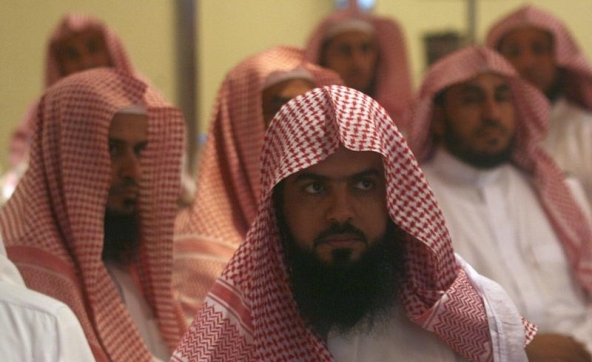
Wahhabi clerics in Saudi Arabia seem not to have much to do, so they ban names.
While a spokesman at the Interior Ministry in Saudi Arabia denied banning 50 names for Saudi families, there were reports which confirmed otherwise.
The Civil Affairs spokesman, Muhammad Bin Jasser Al-Jasser, said: “It is not possible to register names forbidden according to Sharia such as: (Abdul-Rasul, Abdul-Nabi), and the socially inconvenient names such as: (Juhaish, Humair).“
“It is not allowed to use names forbidden by fatwas or hated by Sharia”, Al-Jasser stressed.
Forbidden names according to Sharia? Hated by Sharia? banned by fatwas? Socially inconvenient?

Names-ban is actually a serious issue in Saudi Arabia. The complexity of the links between social and political spheres is overwhelming.
Wahhabism, which is represented by a small group of narrow-minded Ulama (religious scholars), interferes in the private lives of people. Ulama don’t seem to interfere to promote equality, tolerance, peace and respect of other beliefs, but to ban what they perhaps don’t know or understand.
This structure of thinking has been there since the tribal days of Arabia itself. Rejection of the unknown and acceptance of only what have been told from the days of the prophet Muhammad.
Islamic Ulama issuing fatwas in Saudi Arabia don’t necessarily understand or know what they are banning or allowing. Accordingly, they don’t really oppose an issue because they are against it, but rather because it is not yet understood. If the Ulama were not able to find texts in the original sources of Islam – Quran and Sunna (the tradition of the prophet Muhammad) addressing a specific new issue, they simply rule it out as un-Islamic.
Looking back at the history of religious elite in Saudi Arabia, one can draw examples illustrating such rejection. Technology is a contentious issue for Ulama in Saudi Arabia. Obviously recent technological advances have come from civilisations other than the Islamic one, and therefore, any technological development has to be scrutinised by the Wahhabi Ulama.
In many cases committees of theologians such as in the Council of Senior Scholars in Saudi Arabia are responsible for scrutinising such technological developments to decide if they comply with the Islamic law.
Obviously the focus of theologians is theology and preaching of the Islamic religion. It is always problematic, for instance, to explain the mechanisms and function of a satellite to a person who lacks the proper technological knowledge. Therefore, it becomes easier for Wahhabi clergymen to ban something because it is non-understandable or alien for them.
It is shockingly sad to realise that debating such issues with non-Muslims is still un-Islamic for some Wahhabi Ulama. Accordingly, preference to ban is a safe way to go. In the past, satellites were banned because they came from “devil”, the Ulama ruled. Now, most of religious clerics host their TV shows or even channels to espouse their intellectual thought of Islam. They banned TV until King Abdelaziz at that time told them that they could broadcast recited Quran. They banned refrigerator because it was un-Islamic, and they realized that it was good to preserve food.
Rejection of the unknown has been a dominant feature of the Ulama and their supporters. They refused the devilish satellite until they understood the way they could use it to their own purposes. As stories of banning “the un-Islamic” continue to emerge, the foundation of extremist interpretations of Islam have become more organised and extensively active.
Rejection of the unknown in the past was easier to control, but nowadays, globalisation, mass media information and easy access to different kinds of knowledge has made it a hard task for Wahhabi Ulama to remain in control.
One more contradiction remains for the Wahhabis, who decided to take down a strict path of religion: The politics of the Kingdom of Saudi Arabia itself.
The Wahhabi Ulama and the ruling family have been always close. They intervened in political as in social spheres of the Arabian society. At the beginning of the 1930s, King Abdelaziz Al-Saud wanted to get rid of the Muslim Brethren in the Arabian Peninsula, but he had a problematic in launching a war against the Muslim brethren.
According to Islam, the King is not supposed to launch war against other Muslims. He turned to Ulama for a religious solution of whether he had the right to crack the Muslim brethren down. The Ulama in return ruled in favour of King Abdelaziz where the later cleaned Arabia from the Muslim brethren.
The foreign affairs of Saudi Arabia proved to always be in alliance with the United States. Saudi Arabia needed support and protection form the United States as the later needed the oil of the Arabian Peninsula.
In 1990, when Saddam Hussein invaded Kuwait, King Fahd Al-Saud invited the American troops into Saudi Arabia to deter any potential attack against the Kingdom. This meant asking non-Muslims for help against other Muslims to protect the royal realm. The Ulama were divided at that time. Some of them opposed the existence of American troops on the holy land of Islam such as Usama Bin Laden, while others welcomed the assistance of non-Muslim Americans.
The fatwa was as follows: In order to deter any danger against the holy land; it is permissible under the Islamic laws to use the non-Muslim Americans to defend it.
While Ulama cannot survive without the alliance with the ruling family, which represents the political sphere, they only aim at authenticating the Saudi Arabian society. As they are controlled in the political domain, they have the freedom to shape the social one. This freedom covers a range of issues to work on such as banning women from driving, banning women from going out without Abaya, a long black dress covers the woman from top to toe.
Ulama had presence in enforcing the traditional white thaub for men along with other restrictions on prayer times and behaviour in street or in malls. Separation between sexes was not only at work but also at residence. In Saudi Arabia, they have the so-called “compounds”, in which westerners live and Saudi rules don’t apply, so women can go out freely in the compound. Men and women can also talk and meet without restrictions.
They also have “singles buildings”, in which only single men live and no women are allowed to enter. Finally, there are “family buildings”, in which families live, and no singles are allowed to live but of course they can visit their relatives or friends.
Banning names in Saudi Arabia is a social issue that relates to the authentication of the Islamic Saudi Arabian society. However, if the goal they want to reach is a political one such as pledging obedience to the king, or justification of the existence of American troops on Saudi soil, banning doesn’t apply.
This is an issue relates to the political realm and it is subject to the rules of survival of the Kingdom of Saudi Arabia and equally of the Wahhabi Ulama. Rejection of the unknown and banning the un-Islamic is a concept, which depends on the end-effect desired – political or social.
It is worth to wonder if Wahabbi clerics accept the West banning Arabic names such as Muhammad, Ahmed etc. because they don’t sound Christian, western and they come from Arabic language.

